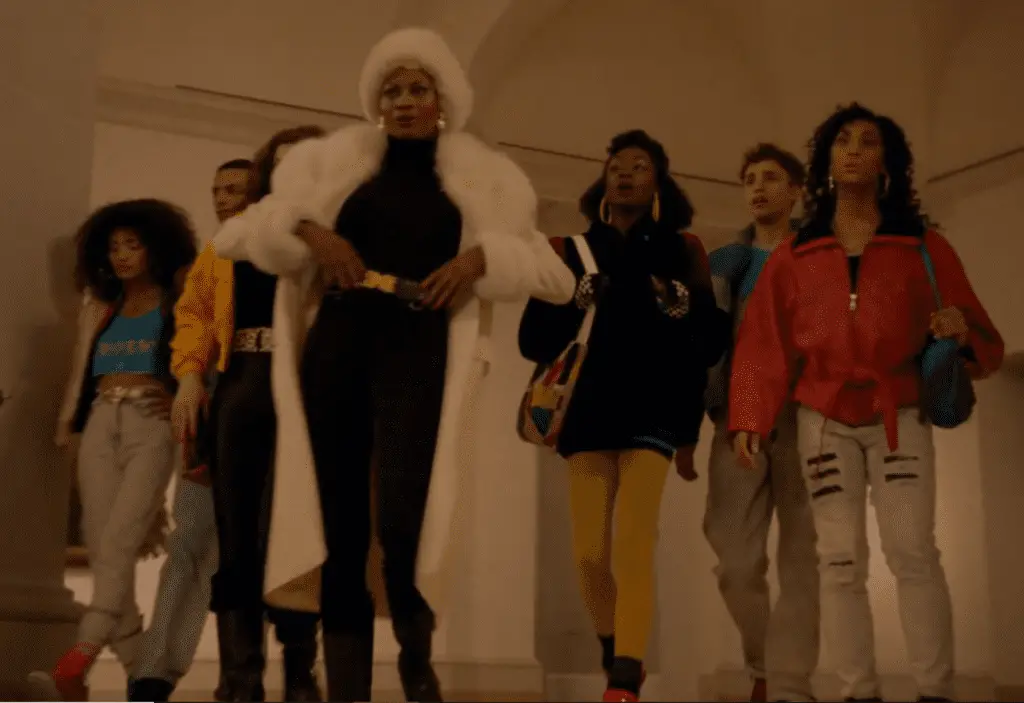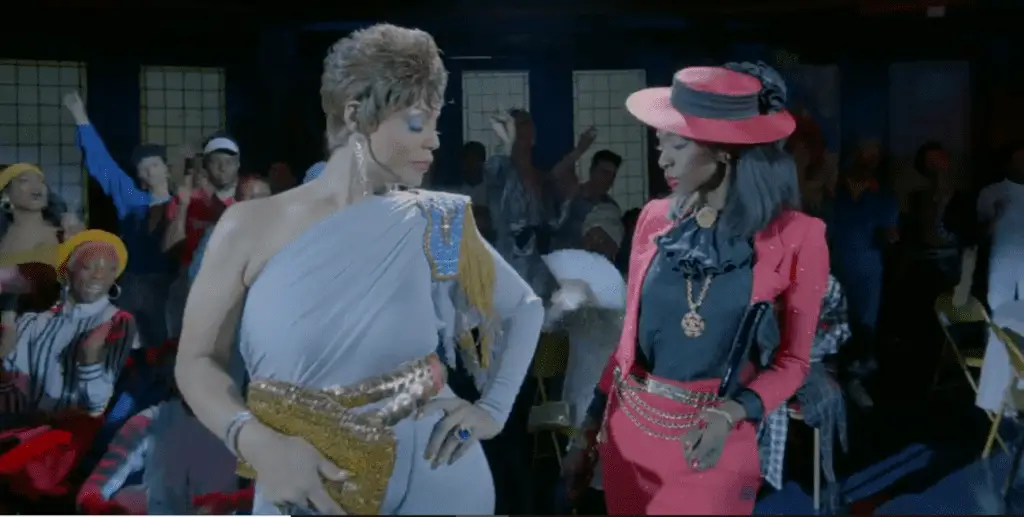I’ll admit it – when I first heard that the creator of Glee was behind the new show Pose, about the drag ball scene in the 1980s, I was worried.
I like Glee, don’t get me wrong. I liked it in part precisely because it was a candy-colored, unicorns-and-rainbows fantasy-land. Even some of the more serious topics it covered were often handled with a light, whimsical touch. For example, high-school bullying involved not much worse than having a Slurpee poured on you. Pose promised to tackle heavy issues and aimed to explore the lives of trans women in a sensitive way. Could these goals work together with the glitter and lights of the Glee aesthetic?
It’s a delicate balance to achieve, to be sure. But I think the answer is yes. Creator Ryan Murphy, with a team of great writers and an amazing cast, pulled off a serious story that still delivers glitz, glamour, and warm, fuzzy feelings.
(Spoilers for Pose follow.)
Mythology and hardships side-by-side

Before watching Pose, the little I knew about the New York drag balls came from the documentary Paris is Burning and the occasional reference on RuPaul’s Drag Race. But Pose deftly fills you in if you’re unfamiliar. We learn about the balls through the eyes of Damon, who is also new to this culture. Damon is a teenager trying to make it on the streets after being brutally kicked out of his parents’ home for being gay. Fortunately, Damon is taken in by Blanca, the star and emotional center of the show.
Pose will also introduce you to the concept of “houses”: found-family units, typically united under a matriarch known as the house mother, whose members compete as a team in the balls. At the start of the show, Blanca makes up her mind and realizes a dream she’s long had. She breaks away from the House of Abundance, headed by the delightfully villainous Elektra, to start a house of her own, the House of Evangelista.
From the get-go in episode 1, Pose dabbles in fantasy. Members of the House of Abundance rob a museum in order to show off real, historical royal finery in a ball competition and somehow nobody gets arrested—a story that has the ring of coming from an urban legend in the drag ball scene. The museum robbery opened the show, and though a bit absurd, it set the tone both for the lengths the characters will go to to look fantastic for the balls and the sense of wonder and fantasy they create with their fashion.
Later in episode 1, Damon gets into a respected dance school even though he missed the application deadline, thanks to Blanca making his case to the head of the school to allow him to audition. This plotline was cliché in some ways and a little hard to swallow. However, it did serve to highlight how hard Blanca is willing to work to support her fledgling house’s children, as well as the high expectations she has for them.
Episode 1 was certainly not all fantasy, though. Damon gets rejected by his parents and kicked out of his house, in a harrowing scene depicting an all-too-common reality for queer teenagers. In another heart-wrenching scene, Blanca finds out she is HIV positive. The show takes place in 1987, well into the AIDS crisis, at a time when treatments were hard to come by and the death toll in the queer community was high.
Through characters like Blanca and Angel, Pose shows us other injustices that impact trans women and women of color. Angel saw a job ad for a boutique and goes to apply; the well-dressed white woman there tells her there is no opening. For Angel and for the audience, it’s unclear whether Angel was rejected for being Puerto Rican, being trans, not having the right clothes, or some combination of factors. The discrimination is all too familiar and serves of an example of how hard it is for many of the characters to make a living.
In a later episode, Blanca and a friend are asked to leave a gay bar, and she goes on a mission to expose the discrimination that trans women face being kept out of establishments that only want to serve (white) cisgender gay men. This plotline was educational for me – it was clearly based on a form of discrimination common in the 1980s, which the realist in me guesses has not been fully eradicated. Sadly, Blanca does not succeed in her mission. She just keeps on getting kicked out of the bars, and since the police are on the establishment’s side, she’d be putting herself in too much danger to keep challenging them. Pose deals with sober realism here: one woman is not enough to change powerful tides of discrimination.
Fun, victories, romance

Despite the hardships and injustices that the characters face, Pose is determined to treat its characters well and give them moments of joy and triumph. This is not a show that wallows in suffering or piles tragedy upon tragedy on its characters.
The balls are a great arena for positive emotions in this show. They’re full of lights and music, gorgeous fashion and vogueing, all orchestrated by the talented fashion designer and M.C. Pray Tell. Everyone looks spectacular – I’m no expert, but to my untrained eye, many of the ensembles modeled by the ball competitors seemed inspired by cutting-edge high fashion of the late 80s. The characters get a chance to strut their stuff, not only their looks but their confidence and charisma. They face off against rivals in ritualized contests, basking in the cheers of the crowd, and taking home giant trophies.
Of course, the balls as depicted in Pose slip a little into the realm of fantasy. After a few false starts, Blanca’s brand-new house, the House of Evangelista, begins to win competitions, beating out the long-dominant House of Abundance. Whenever a contestant wins a category, the five judges inevitably give him or her unanimous “10”s. Some of these scenes gave me Glee flashbacks, thinking of how our underdog glee group beat all the odds to win their competitions again and again. But it’s hard to care too much about plausibility when the balls are just so much fun – for the characters, and for the viewer.
The show also has romantic arcs for many characters. Damon meets his boyfriend, Ricky, early in the season, and they enjoy a happy, supportive relationship. Blanca accepts Ricky into her house, and they live together in a run-down but spacious apartment with the other house children, Lil Papi and Angel. Damon and Ricky are an almost unbearably cute couple. They also are one of the only examples of a romantic relationship between two Black men on TV.
Other characters have relationships that are not always the healthiest, but over the course of the season they escape from them and move on. While working as a sex worker, Angel meets a married businessman named Stan who turns into a major relationship. There are moments when Stan seems sweet and caring: he shows interest in the balls that are so important to Angel, and has a relatively respectful response (compared to Elektra’s partner) to Angel’s desire to have surgery. In fact, sometimes, I felt like Stan seemed a little too nice. For a while, I wondered whether Pose was actually asking the audience to root for Stan and Angel as a couple even though Stan let Angel down over and over again, and kept lying to his wife, a sympathetic character in her own right. But Pose came through. Angel leaves Stan in the end, recognizing that she deserves better.
Pray Tell’s new romance at the end of the season was one of the sweetest. Pray Tell is a character who’s been through a lot. He watched his boyfriend die of AIDS, and finds out he is HIV positive himself. He goes through a period of hopelessness. In that time, the loving support offered by his close friend Blanca is crucial, even life-saving. Blanca and his other friends don’t let him give up on life. Eventually, he gets back on his feet and agrees to go on a date with a lovely guy who’s been interested in him for a while.
One quibble I had with the romantic plots was that there was a repeating pattern in them. The love interests to the main characters were always the initiator, and they all had a similar chivalrous, sweep-you-off-your-feet way of flirting, with just minor variations. This was clear with the man who flirts with Blanca. At first he appears charming, but he turns out to be a player who everyone’s had and nobody trusts. In any case, his flirting looked to me a whole lot like Ricky’s with Damon, and Pray Tell’s admirer with Pray Tell, except for with the cheesiness factor dialed up a bit. I think the show was going for a certain fairy-tale romance aesthetic that can be appealing, but that got old for me after a while – it’s awfully heteronormative for a show centering queer people. Nonetheless, I appreciated the romantic plotlines because it was so important to see these characters, vulnerable in so many ways, have happiness and joy from multiple domains of life.
Loving families

Love and support from family is the essential theme in Pose. ‘Family’ here refers to the houses, as well as friendships that go deeper than blood – as Blanca tells Pray Tell, “You’re family.”
The main characters have been rejected by their biological families for who they are. We see this happen to Damon in the first episode. Later on, we hear stories from Angel and Blanca’s pasts, which include parental maltreatment and rejection. And we witness how cold and cruel Blanca’s relatives are to her at her mother’s funeral. For the characters of Pose, biological family usually fails in providing loving support, and at its worst can be a source of trauma. As mentioned above, this is sadly common for queer people in the 1980s and today. This is why the houses have been such an important institution in the queer community. Pose does an excellent job demonstrating this.
Blanca has a vision for what she wants her house to be, for what kind of a mother she wants to be. She defines herself in opposition to her former house mother, Elektra, who is domineering and selfish with her children. Blanca guides Damon’s dance career, gives advice to Angel, and in general provides endless kindness and support to her children. She is appropriately strict with them as well, making sure they contribute to the house’s finances, stay in school, and clean their rooms.
Blanca’s mothering could almost have veered into the fantastical, as she is depicted as a preternaturally good mother and friend. However, she does make one decision that provided an interesting moral dilemma in the show. This is when she kicks Lil Papi out of the house when she discovers he has been selling drugs, violating her house rules. Once kicked out, Lil Papi is in immediate danger of becoming homeless. His boss also asks him to sell harder drugs, and then he is arrested. He is lucky enough to have dropped his stash before he is caught, so with no evidence, he is released. I was biting my nails watching this storyline, though, seeing the downward trajectory of Lil Papi’s life and how he might end up in prison. It’s mostly through sheer chance that that doesn’t happen: the show is pretty clear how close a call it was for him. Because of that, Blanca reassesses her decision. She forgives Lil Papi and lets him back in the house. Her rules are important for her children – she is right to have expectations for them. But they aren’t worth ruining one of her children’s lives over.
The familial bonds of the house are solidified even more toward the end of the season. Blanca has been keeping her HIV status secret from her children, but in a heartbreaking scene, she finally reveals it to Angel, who she wants to take over as mother of the house when she’s gone. Additionally, Blanca rescues Elektra. Elektra has been abandoned by her long-suffering children and by her lover, who had been paying her rent and other expenses. She ends up temporarily homeless, until Blanca selflessly takes her in. Elektra hasn’t done a lot recently to deserve this – she’s been unkind to Blanca at best – but, in a flashback, we see how Elektra took Blanca under her wing when she was young and lost. Beyond even any loyalty to her mother Blanca might feel, her deep sense of empathy compels her to help.
When Blanca wins “Mother of the Year” at the final ball of the season, it’s a predictable happy ending in some ways, but it feels earned. It’s true that in Pose, there’s a fairy-tale element at times. Many things go a little too perfectly to be totally believable: the last-minute dance school acceptance, the charming male suitors, the perfect-10 ball awards, the high fashion. Characters like Elektra and Lil Papi fall on hard times, but only briefly before someone comes to their rescue or they get on their feet again. Despite all that, the show doesn’t shy away from many serious, realistic issues. I think for many viewers, we’re relieved to watch something about characters from marginalized groups—queer people of color in this case—that isn’t non-stop tragedy and that deals equally in light and joy and love. These characters deserve happy endings, and if anything, the happiness made Pose an even better show.

